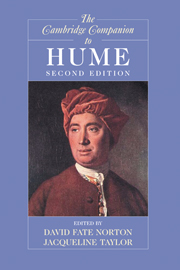Book contents
- Frontmatter
- 1 An Introduction to Hume’s Thought
- 2 Hume’s New Science of the Mind
- 3 Hume and the Mechanics of Mind: Impressions, Ideas, and Association
- 4 Hume’s Theory of Space and Time in Its Skeptical Context
- 5 Hume on Causation
- 6 Hume and the Problem of Personal Identity
- 7 Hume’s Skepticism
- 8 Hume’s Moral Psychology
- 9 The Foundations of Morality in Hume’s Treatise
- 10 Hume’s Later Moral Philosophy
- 11 The Structure of Hume’s Political Theory
- 12 Hume’s Principles of Political Economy
- 13 Hume on the Arts and “The Standard of Taste”: Texts and Contexts
- 14 David Hume: “The Historian”
- 15 Hume on Religion
- Appendix: Hume’s Autobiographies
- Selected Bibliography
- Index
- Series List
9 - The Foundations of Morality in Hume’s Treatise
Published online by Cambridge University Press: 28 May 2009
- Frontmatter
- 1 An Introduction to Hume’s Thought
- 2 Hume’s New Science of the Mind
- 3 Hume and the Mechanics of Mind: Impressions, Ideas, and Association
- 4 Hume’s Theory of Space and Time in Its Skeptical Context
- 5 Hume on Causation
- 6 Hume and the Problem of Personal Identity
- 7 Hume’s Skepticism
- 8 Hume’s Moral Psychology
- 9 The Foundations of Morality in Hume’s Treatise
- 10 Hume’s Later Moral Philosophy
- 11 The Structure of Hume’s Political Theory
- 12 Hume’s Principles of Political Economy
- 13 Hume on the Arts and “The Standard of Taste”: Texts and Contexts
- 14 David Hume: “The Historian”
- 15 Hume on Religion
- Appendix: Hume’s Autobiographies
- Selected Bibliography
- Index
- Series List
Summary
I found that the moral Philosophy transmitted to us by Antiquity, labor'd under the same Inconvenience that has been found in their natural Philosophy, [namely,] of being entirely Hypothetical, & depending more upon Invention than Experience. Every one consulted his Fancy in erecting Schemes of Virtue & of Happiness, without regarding human Nature, upon which every moral Conclusion must depend. This therefore I resolved to make my principal Study, & the Source from which I wou'd derive every Truth in . . .Morality.
KHL 6In Book 2 of the Treatise of Human Nature Hume reports that a question concerning the foundation of moral distinctions had “of late years” been of great public interest. The question is whether “moral distinctions” (distinctions between virtue and vice) are “founded on natural and original principles,” or arise “from interest and education.” He then suggests that those who traced the distinction between virtue and vice to “self-interest or the prejudices of education” supposed that morality has “no foundation in nature.” In contrast, those who said that moral distinctions are founded on natural and original principles supposed that “morality is something real, essential, and founded on nature” (T 2.1.7.2-3, 5). This debate, as we will see, raised both an ontological question (which features of the world, if any, do our moral judgments reflect?) and an epistemological question (which of our faculties, reason or sense, enables us to grasp moral distinctions?).
- Type
- Chapter
- Information
- The Cambridge Companion to Hume , pp. 270 - 310Publisher: Cambridge University PressPrint publication year: 2008
- 1
- Cited by



